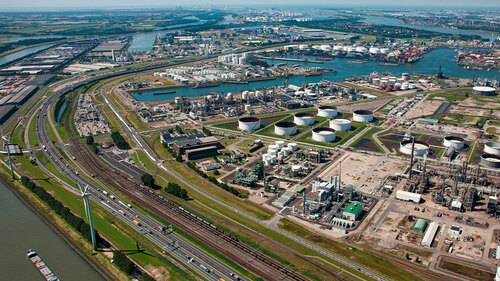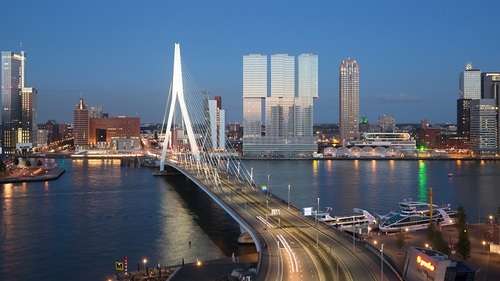Air Products to Build Europe’s Largest Blue Hydrogen Plant and Strengthens Long-term Agreement in Rotterdam, The Netherlands
Air Products today announced it will build, own and operate a state-of-the-art carbon capture and carbon dioxide (CO2) treatment facility at its existing hydrogen production plant in Rotterdam, the Netherlands. The facility is expected to be on-stream in 2026, and the resulting "blue" hydrogen product to serve ExxonMobil’s (Esso) Rotterdam refinery and additional customers via Air Products' hydrogen pipeline network system. This will be the largest blue hydrogen plant in Europe once operational.
The carbon capture retrofit will capture CO2 from Air Products' existing hydrogen plant and ExxonMobil’s Rotterdam refinery. The plant will be connected to the Porthos system, a consortium developing the first large-scale CO2 transport and storage system in the Netherlands which recently reached final investment decision approval. Along with CO2 from other industry in the port of Rotterdam, the captured CO2 will be transported to depleted gas fields in the North Sea, approximately 20 kilometers off the coast, where it will be permanently stored at a depth of more than three kilometers beneath the seabed.
Porthos allows Air Products to more than halve its CO2 emissions in the port of Rotterdam. This represents a substantial step for reducing Air Products’ direct emissions in the short term and contributes to meeting the Dutch National Climate Agreement targets. At the same time, Air Products is working hard to further decarbonise its own activities and those of its customers by realising plans to make green hydrogen available from imported renewable energy in the port of Rotterdam.
The project is being undertaken as part of long-term agreements with ExxonMobil and the Dutch State. Blue hydrogen from Air Products’ hydrogen production plant will help customers in industry and mobility transition, whilst also creating and retaining jobs in an important industrial area.
“Air Products has been actively present and investing in Rotterdam for decades,” commented Chief Operating Officer Dr. Samir J. Serhan. “Industrial companies here are continually looking for ways to realize synergies, create economies of scale, drive energy efficiencies and ultimately decarbonise. This project fulfils that demand. By sequestering CO2 through Porthos and bringing additional blue hydrogen to ExxonMobil and other customers, we can help generate a cleaner future.”
“ExxonMobil aims to achieve net-zero Scope 1 and Scope 2 emissions from its operated assets by 2050 and we’ve taken a comprehensive approach to create emission-reduction roadmaps for each of our facilities,” said Edward Dekker Kleijn, Rotterdam Site Manager. “We are pleased to build on our collaboration with Air Products to lower our environmental footprint. Carbon Capture and Storage is one of the critical technologies required to achieve the climate goals. This project is a great example of how industry works together to reduce carbon dioxide emissions in the Rotterdam port area.”
Categories
Investments
Latest news
Kemira’s Activated Carbon Reactivation Plant in Helsingborg Approved – Site Celebrates 150 Years of Innovation
The new plant, which will require alow double-digit million-euro investment, is designed toreactivate spent granular and pelletized activated carbon, enabling reuse indrinking water and wastewater ...
Technip Energies to acquire Ecovyst’s Advanced Materials & Catalysts business
Chemical Cluster Delfzijl →Technip Energies (PARIS:TE) announces that it has entered into a definitive agreement to acquire the Advanced Materials & Catalysts business from Ecovyst Inc. (NYSE: ECVT), a global leader in speci...
Symrise starts production unit in Granada enabling a more secure and sustainable supply of Hydrolite® 5 green
Symrise announces the opening of a new production unit at its facility in Granada, Spain. The plant is dedicated to Hydrolite® 5 green, the high-quality, biobased pentylene glycol from its Cosmetic...
Exolum to Drive Transition Towards Sustainable Fuels at Düsseldorf Airport with €70 Million Investment
The company will build and operate for 20 years a new storage and distribution plant at Düsseldorf Airport, Germany’s fourth largest, connected to the railway network to reduce road transport and C...



